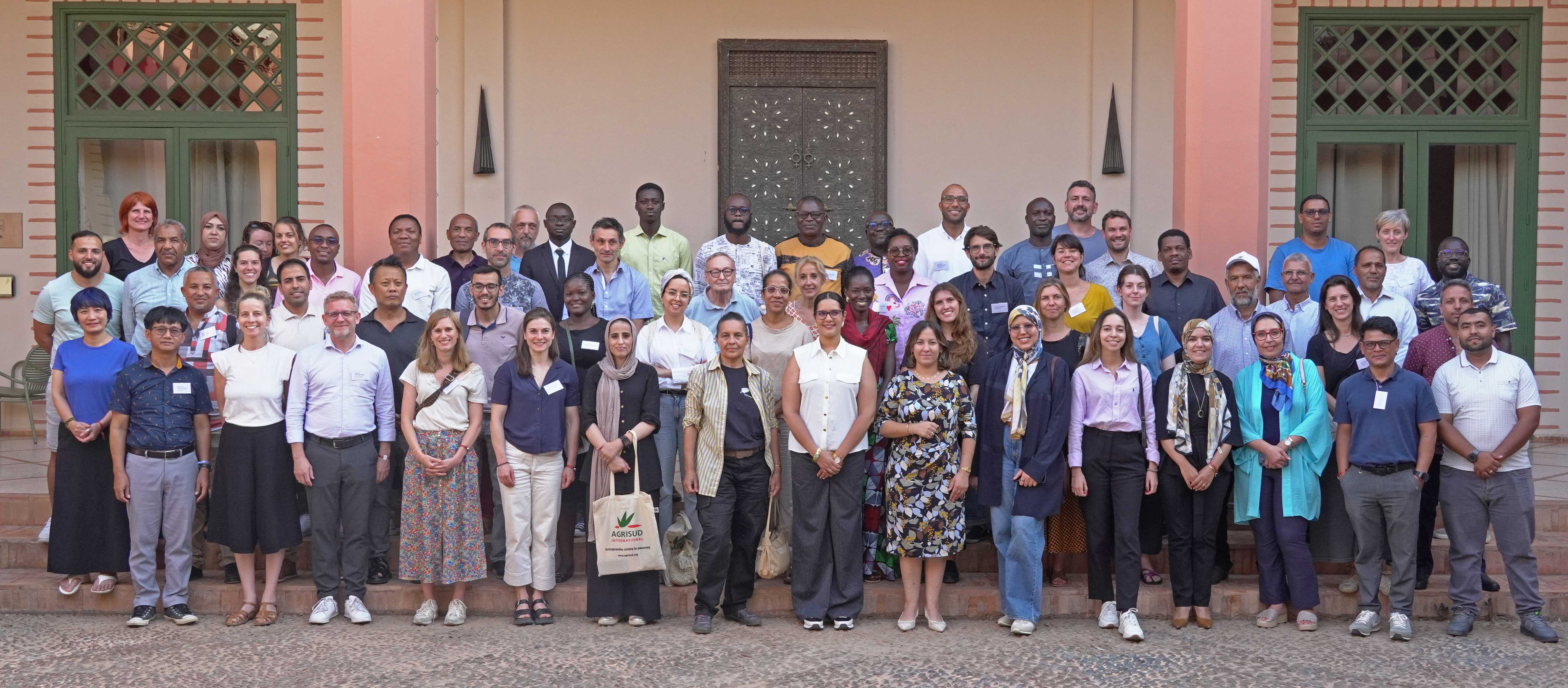-
Publié le : 11-07-2025
-
Type : Projet
From July 1 to 4, 2025, Agrisud brought together nearly 50 people - employees and partners - in Marrakech as part of the AGRITER and DELFI programs, co-financed by AFD.
Over four days, discussions focused on the implementation, impact assessment, and prospects for the development of actions carried out in the sectors and territories.
The Norsys Foundation and Club Med, partners of Agrisud, took part in the seminar and contributed to its success by organizing field visits and providing logistical support, respectively.
Strengthen the work of Agrisud and its partners by sharing perspectives and evaluating impact
The seminar had two objectives. Firstly, it sought to reflect on how to improve the actions carried out within the framework of the AGRITER and DELFI programs, based on Agrisud's fundamental principles: professionalization of small family farms, structuring of sustainable sectors, and support for regional projects. These three pillars guided the work throughout the week.
The aim was also to prepare the impact assessment of the two programs, which are at different stages: AGRITER is in its third and final phase, while DELFI began in September 2024 (see box below).
Nearly 40 employees from 11 countries took part in the workshops: Benin, Brazil, Cambodia, Côte d'Ivoire, France, Haiti, Laos, Madagascar, Morocco, Senegal, and Vietnam.
Eight partner organizations were also present: Agence française de développement, CATI - Technical Agricultural Services of the State of São Paulo in Brazil, Club Med, Hauts-de-Seine Department, Nouvelle-Aquitaine Region, a cosmetics company, Fondation Avril, and SENS Benin.
The exchange of ideas between the teams and partners present was one of the highlights of this seminar. It provided an opportunity to question practices, challenge methods, and bring in other points of view to improve project implementation.
This seminar is a continuation of the 2024 seminar, which focused on impact measurement and scaling up.

Morocco, a testing ground for «sectors and territories» initiatives
The choice of Morocco as the venue for the seminar is no coincidence. This country, where Agrisud has been active for over 20 years, perfectly illustrates the implementation of the two programs.
Visits were organized to enable participants to gain a first-hand understanding of the issues at stake in the local context, through direct exchanges with farmers, elected officials, technical partners, and others...
-
In Ouarzazate, discussions focused on mobilizing various stakeholders in the implementation of regional projects, including technical support for farms, collaborative resource management, and strengthening cooperative dynamics.
-
In the palm grove of Marrakech, discussions explored the development of sustainable commercial sectors, particularly support for small agricultural businesses to improve their access to markets.
These two territories served as case studies to fuel the workshops' discussions. They provided concrete examples of the changes made possible thanks to the support of Agrisud and its partner, the Norsys Foundation: adoption of sustainable agricultural practices, structuring of local supply chains, and multi-stakeholder partnerships to strengthen the resilience of these territories.

A conference to open dialogue on agroecological transitions
The seminar also provided an opportunity to broaden the dialogue during an open conference devoted to agro-ecological transitions in different regions. It brought together around 60 participants, including some 15 Moroccan stakeholders involved in the development of sustainable agriculture. Among them were representatives from public institutions and research, technical services, training, civil society, and professional agricultural organizations.
This diversity of stakeholders fueled discussions on the conditions for successful agro-ecological transitions, based on shared field experiences and different perspectives.
Among the notable speeches was that of Florence Priolet, Project Manager for Partnerships with Civil Society Organizations at the AFD's North Africa Regional Directorate:
« One of the key elements for success is long-term support, because change takes time. AFD’s goal is to build long-term relationships with its partners and support these NGO projects as they scale up. This requires the ability to generate and capitalize on knowledge, then disseminate it. We also work to promote the creation of stakeholder groups. Finally, the commitment of public actors is essential, without which scaling up cannot be achieved. »
This seminar helped to reinforce a shared vision of the challenges associated with agroecological transitions, drawing on the diversity of contexts, expertise, and feedback.
It also constituted an important step in the implementation of the AGRITER and DELFI programs: by sharing perspectives, evaluating practices, and capitalizing on lessons learned, participants helped to consolidate approaches and fuel the collective dynamics driven by these two program agreements.

> Find out more about the AGRITER program
> Find out more about the DELFI program
-------------------------------------------------------------------------------------------------------------------------------------
[Insert] Agrisud's activities are structured around AGRITER and DELFI: two multi-country programs with complementary approaches.
The AGRITER program, which has been in place for nine years, aims to establish a supportive framework for the development of sustainable agriculture. It assists family farms in improving their practices and supports local actors in regional projects at the geographical, institutional, economic, and sociocultural levels. It thus creates the conditions necessary for the emergence of resilient agricultural systems, rooted in their territory and supported by concerted local governance.
DELFI, a program currently in its start-up phase, focuses on developing sustainable and inclusive supply chains. It supports family farms in adapting their offerings and strengthens their ability to access local, regional, national, and even international markets. It creates the conditions necessary for the sustainable integration of farms into these commercial channels, based on sustainable agricultural practices, equitable partnerships, and inclusive territorial dynamics.
This complementarity between the two programs reflects Agrisud's commitment to providing long-term support to family farms in their economic development, while improving families' living conditions and strengthening environmentally friendly practices.



